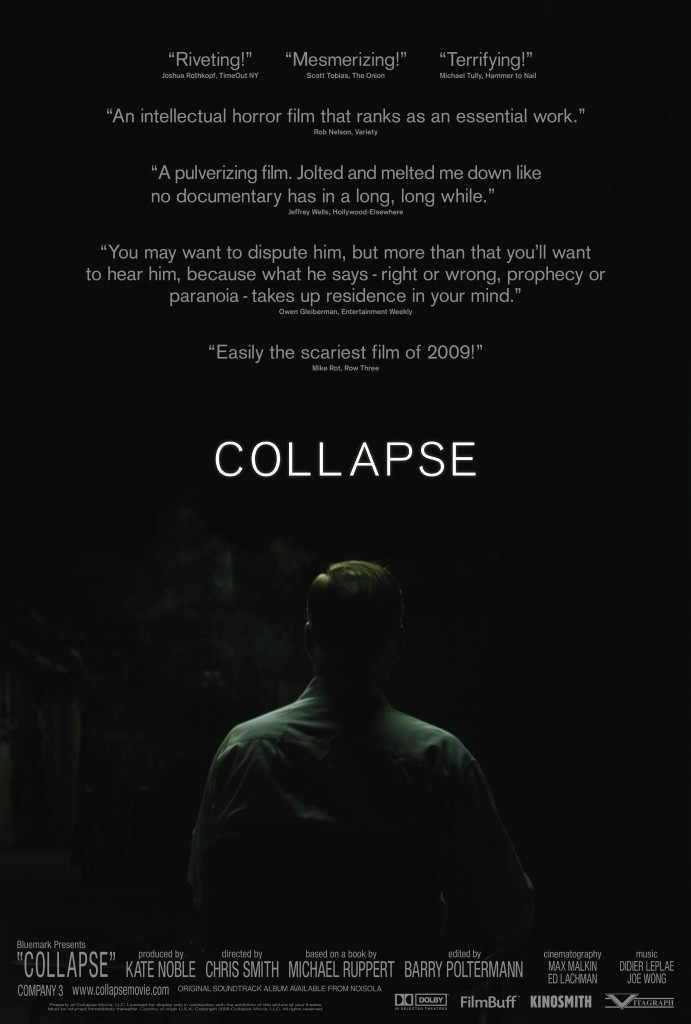 Michael Ruppert, an independent reporter who’s the subject of a documentary called “Collapse,†talks very seriously about what can happen to things like energy and money in the future, and he deserves to be heard and debated over. It’s hard to take everything he says as the gospel, though, especially because this movie seems less concerned with these predictions than with the guy making them. Since Ruppert’s the only subject who gets interviewed here, it makes you wonder why the filmmakers didn’t try to come up with at least one other person who can confirm or deny all the troubling theories he has about what the future has in store for us.
Michael Ruppert, an independent reporter who’s the subject of a documentary called “Collapse,†talks very seriously about what can happen to things like energy and money in the future, and he deserves to be heard and debated over. It’s hard to take everything he says as the gospel, though, especially because this movie seems less concerned with these predictions than with the guy making them. Since Ruppert’s the only subject who gets interviewed here, it makes you wonder why the filmmakers didn’t try to come up with at least one other person who can confirm or deny all the troubling theories he has about what the future has in store for us.
A great deal of this film focuses on Ruppert’s take on how we’re handling the energy crisis, and even though you’d think he’d have nothing new to say at this late date about our alternatives to oil, he still manages to reveal little-known details about them, like what makes some more promising than others. He claims that since some of our natural resources require more energy to maintain than they’re worth, we should probably look into solar and wind, which might be the best chance we have of getting off of oil.
As if getting on nature’s bad side weren’t scary enough, our planet isn’t the only thing at stake. Ruppert claims that the fallout of the economy last year is something that he was certain would happen, and as bad as it was, that was just the beginning. Over time, he says, money will be all but worthless – gold will appreciate in value to the point where, along with food, it becomes a bare necessity, and the fact that the price of gold has increased during the recession suggests he might be onto something.
Then how come “Collapse†doesn’t take him seriously? Sure, this guy isn’t playing with a full deck of cards (the idea that we can learn a thing or two from wolves about togetherness reduces him to tears), but instead of either exposing him as a nut or celebrating him for thinking outside the box, all this film does is take what he says at face value without finding out if any of it holds water. It seems right that he comes across as a paranoid loner who doesn’t know who he can trust anymore – the question is whether anybody can trust him.

“Sure, this guy isn’t playing with a full deck of cards (the idea that we can learn a thing or two from wolves about togetherness reduces him to tears)”
Pretty sure you missed the point and seeing a grown man well up was too much for you. Walk a mile in his shoes, then write.
“..but instead of either exposing him as a nut or celebrating him for thinking outside the box, all this film does is take what he says at face value without finding out if any of it holds water. It seems right that he comes across as a paranoid loner who doesn’t know who he can trust anymore – the question is whether anybody can trust him.”
Maybe that wasn’t the point of the film.
Needless to say you have resorted to attacking the guy without having a clue about the substance of the movie. If you research, just a little bit, about Michael Ruppert and the statements he makes you’ll see that what he purports is quite real. 90min is far too short a time to flush out all the details about what he talks about.
Peak Oil, Economic Collapse and net energy just seem new to you. That’s alright, but you might want to educate yourself a bit; for your own sake.
Enjoy the music on the Titanic buddy, or start building a raft.